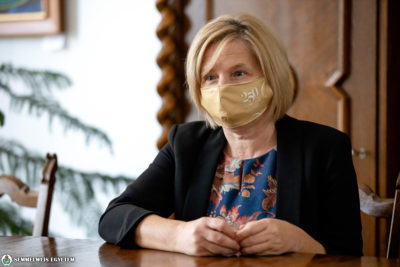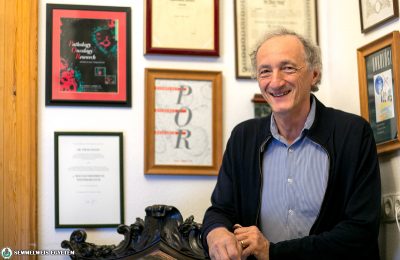Dr. Éva Szabó Feketéné has been appointed vice-rector for strategy and development of Semmelweis University on October 1, 2020. Since August 1, 2020 she has been carrying out her duties as an acting vice-rector. Out of the projects she is responsible for, she highlighted the establishment of the Family Friendly University Program, the development of community space for students, the mentor training program, the developmental strategy of public educational institutions and several other developmental projects initiated by Dr. Balázs Hankó, the former vice –rector for development and strategy. As regards her assignment, she considers the fact that there is an opportunity for the smaller and more novel faculties to play an important role in senior leadership of utmost importance.
 It is surprising and unexpected, and in the meantime extremely honourable to receive such an invitation, which I consider as an enormous opportunity for our faculty as well – said Dr. Éva Szabó Feketéné. She was appointed vice-rector for strategy and development by Dr. Béla Merkely, rector, after Dr. Balázs Hankó, the former vice-rector has become deputy state secretary for higher education at the Ministry for Innovation and Technology. Dr. Éva Szabó Feketéné, who has been the dean of András Pető Faculty, and currently is also the head of the Centre for Conductive Pedagogy, has been carrying out her duties as an acting vice-rector for strategy and development since August 1, 2020. Her application for the vice-rector post was supported by the Senate of the university on its session being held on September 24. According to Dr. Éva Szabó Feketéné, this invitation is also a recognition of András Pető Faculty, which means that the senior leadership of the university acknowledges the faculty’s activities and the establishment of the integration. She reckons that her appointment also indicates the significance of smaller faculties, which means that they can also play a role in senior leadership. With her assignment, now there is a female member among the vice-rectors of the university, which, as she describes, can result in the emergence of new aspects, new attitudes as this is a university where more than 70% of the employees are women. She highlighted how much support she has received from other vice-rectors and deans related to her new responsibilities.
It is surprising and unexpected, and in the meantime extremely honourable to receive such an invitation, which I consider as an enormous opportunity for our faculty as well – said Dr. Éva Szabó Feketéné. She was appointed vice-rector for strategy and development by Dr. Béla Merkely, rector, after Dr. Balázs Hankó, the former vice-rector has become deputy state secretary for higher education at the Ministry for Innovation and Technology. Dr. Éva Szabó Feketéné, who has been the dean of András Pető Faculty, and currently is also the head of the Centre for Conductive Pedagogy, has been carrying out her duties as an acting vice-rector for strategy and development since August 1, 2020. Her application for the vice-rector post was supported by the Senate of the university on its session being held on September 24. According to Dr. Éva Szabó Feketéné, this invitation is also a recognition of András Pető Faculty, which means that the senior leadership of the university acknowledges the faculty’s activities and the establishment of the integration. She reckons that her appointment also indicates the significance of smaller faculties, which means that they can also play a role in senior leadership. With her assignment, now there is a female member among the vice-rectors of the university, which, as she describes, can result in the emergence of new aspects, new attitudes as this is a university where more than 70% of the employees are women. She highlighted how much support she has received from other vice-rectors and deans related to her new responsibilities.
Under the direction of Dr. Balázs Hankó, plenty of strategic and developmental processes have been started, the majority of which were continued in the current epidemiological situation as well, and this is the merit of a lot of colleagues – said she.
Out of the projects she is responsible for, she highlighted the establishment of the Family Friendly University Program; she is particularly fond of this project. “The university functions well, when its citizens are well”, said she. In the health care and university of the future, keeping the best professionals is a crucial question. This can be facilitated by us in several ways: parents have the opportunity to work while the daily care of their children is ensured at the university’s crèche and kindergarden, and we can also grant access to our colleagues for cultural and sport events, as well as to health care – she pointed out. As the vice-rector described, the establishment of a university crèche is in the agenda, of which the professional supervision will be accomplished by András Pető Faculty. Currently there is a search for the most suitable location for this.
She considers the keeping of key figures, who have been working at Semmelweis University for a long time, as well as the attracting of the best young colleagues of utmost importance. In order to achieve this, the application of flexible, atypical forms of employment is a significant tool, which can be realized on local levels, but on the basis of a common approach. Regarding this, she aims to devote an important role to the experiences of employee representation.
 The development of community space for students is among her priority projects, of which the purpose is to establish places where students like to spend their time, to deepen their social relationships, to do sports, to recharge with energy, to study, to chat and to relax. Such community spaces will be created on three locations in the first place in the framework of a development project of 170 million HUF: in the inner and outer courtyards of the Anatomy Block, the inner courtyard of the Central Health Care Building and at the Nagyvárad tér Theoretical Building.
The development of community space for students is among her priority projects, of which the purpose is to establish places where students like to spend their time, to deepen their social relationships, to do sports, to recharge with energy, to study, to chat and to relax. Such community spaces will be created on three locations in the first place in the framework of a development project of 170 million HUF: in the inner and outer courtyards of the Anatomy Block, the inner courtyard of the Central Health Care Building and at the Nagyvárad tér Theoretical Building.
Dr. Éva Szabó Feketéné is responsible for the supervision and coordination of Semmelweis XXI Developmental Project as well, except for the projects related to the clinics, which will belong to the responsibility of the vice-rector for clinical affairs in the future. There are several projects in this package, out of which the most prominent ones are EOK 2 (Basic Medical Science Center), Hőgyes-Schöpf-Merei Pharmaceutical Research Center, the development of the Faculty of Health Sciences and that of András Pető Faculty as well as student dormitory investments.
The developmental strategy of public educational institutions also belongs to her responsibilities. The four health care professional training institutions joined the university last year, and Dr. Éva Szabó Feketéné is supervising the further reinforcement of their integration so that – following the merger – the content integration could also be strengthened and the university would be able to provide a career model for these institutions as well.
The vice-rector for strategy and development described an initiation, according to which the purposes of the rector’s program have become quality objectives. The formulation of these has already taken place, which will be followed by a practical realization. Among others, the following objectives belong to this group: the continuation of the curriculum reform, the development of the digital educational environment, the procurement of ‘family friendly’ certification mark, the reinforcement of fund raising activities, the development of community space for students, the mentor training program (provides support for the integration of first year students), the increase of the number of alumni members and the reintroduction of career services for students – said she.
In a changing health care, auxiliary professions will pay a more and more important role in parallel with the medical, pharmaceutical and dental activities, represented by employees who provide support for people living with permanent health deficits in order to have a better quality of life. “Besides the students of history faculties, our university educates the leaders, cultivators and rehabilitation professionals of future health care. An enormous knowledge is accumulated, therefore it is very important for the university to use and build on the experiences of all the faculties”, emphasized Dr. Éva Szabó Feketéné. Becoming a member of the TOP 100 can only be successful in case all the faculties provide their own expertise for the sake of the realization of these objectives – she added.
Pálma Dobozi
Photo: Attila Kovács – Semmelweis University
Translation: Katalin Illés-Romhányi


